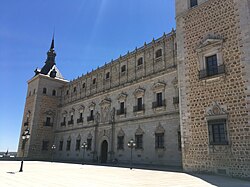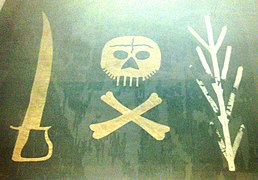| Museo del Ejército | |
 | |
 | |
| Established | 2010 on present site |
|---|---|
| Location | Toledo, Spain |
| Coordinates | 39°51′31″N 4°01′14″W / 39.8587°N 4.0205°W / 39.8587; -4.0205 |
| Owner | General State Administration |
| Public transit access | Toledo railway station |
The Museum of the Army (Spanish: Museo del Ejército) is a military museum in Toledo, Spain, devoted to the history of the Spanish Army. It is one of the National Museums of Spain and it is attached to the Ministry of Defence.
The collection was previously housed in Madrid, and the museum opened on its present site in 2010. It occupies two linked buildings, Toledo's historic Alcázar (castle) and a purpose-built extension.
History
The history of the museum began in 1803 when the royal military museum was established in a building in Madrid known as the Palacio de Monteleón. The building also served as a barracks for artillery units and it was attacked and looted by the French when they suppressed the Dos de Mayo Uprising of 1808. The museum was reestablished, but in 1827 it was divided into two sections: the Museo de Artillería and the Museo de Ingenieros. Later the collections were unified and housed in the Hall of Realms.
In the twenty-first century the collections were moved from Madrid to Toledo. The new premises offered much more space, although the site was not without controversy because of its associations with the Siege of the Alcázar, an episode in the Spanish Civil War, when the castle was held by Nationalist forces. In the aftermath of the war, the ruins of the building became a propagandistic memorial to the Francoist victory. Yet still, the choice of content and the museographic treatment proved to be even more controversial.
The new museum was opened in 2010 by Felipe, Prince of Asturias.
The Alcázar
The Alcázar is used for the Permanent Exhibition. Some rooms are devoted to chronological displays reflecting the history of Spain twinned with that of its Army, other rooms show the collections thematically.
The new building

The new building houses the administrative offices, the Temporary Exhibitions room, the Army room in the present time, the didactic classroom, the auditorium, the archive, the library, the coffee shop, the restoration workshops and the warehouses, all of them endowed with the greatest technical advances for the conservation, restoration, cataloging, investigation and diffusion of the funds that are guarded.
Archaeology
Some items are archaeological. The displays include finds from excavations at the Alcázar which were undertaken prior to construction of the museum extension.
Display cases and individual items
Some of the display cases belonging to the museum are of interest in their own right with decorative details reflecting their contents.
The museum contains many miniature replicas of battles.
The displays on the 20th century include a 1930s Enigma machine in its original box. The Spanish have preserved a number of Enigma machines, modified versions of the commercial machine, which were obtained by Franco from Nazi Germany. In 1937, the British cryptographer Dilly Knox broke Franco's Enigma, but knowledge of this breakthrough was not shared with the Republicans. Two of the Spanish Enigma machines have been presented to British institutions in return for Enigma-related material.
Gallery
-
Bronze cannon Plasencia of 9 cm Model 1878 Krupp. Manufactured in the Royal Artillery Factory of Seville
-
16th-century armours, Medinaceli Collection
-
 Flag of Ramón Cabrera
Flag of Ramón Cabrera
-
Costume of a cavalryman of the Trozo de Milan
-
Japanese armor, end-Edo period (1603–1868)
-
Armor of the Duke of Alcalá
-
 The personal sword, sultan clothing and shoes worn by Muhammad XII (last emir of Granada) during the battle of Lucena
The personal sword, sultan clothing and shoes worn by Muhammad XII (last emir of Granada) during the battle of Lucena
-
 Enigma machine
Enigma machine
References
- Pérez de Andrés, Carmen (2011–2012). "Los tiempos del Museo del Ejército" (PDF). Museos.es: Revista de la Subdirección General de Museos Estatales (7–8): 331. ISSN 1698-1065.
Orgánicamente el Museo del Ejército es un museo de titularidad y gestión estatal y categoría nacional con sede en el Alcázar de Toledo, adscrito al Ministerio de Defensa
- Gooch, Adela (5 February 1999). "Museum revives memories of Spain's dark era". www.theguardian.com. Retrieved 2020-05-16.
- ^ Lanzarote Guiral, José María (2011). "National Museums in Spain: A History of Crown, Church and People". In Aronsson, Peter; Elgenius, Gabriella (eds.). Building National Museums in Europe 1750-2010 (PDF). Linköping University Electronic Press. pp. 872–873.
- "El príncipe Felipe inaugura el Museo del Ejército, que llega tras 14 años al Alcázar de Toledo" (in Spanish). RTVE. 2010.
- "Military museum". www.toledo-turismo.com. Retrieved 6 April 2017.
- "Un museo con las vitrinas vacías" [A museum with empty display cases]. El País (in Spanish). February 2017. Retrieved 6 April 2017.
- "Maquetas [Mock-ups]".
- "Miniaturas y modelos [Thumbnails and models]". Army Museum - official website.
- "Instruments and equipment".
- Corera, Gordon (2012). "The Spanish link in cracking the Enigma Code". BBC. Retrieved 28 January 2022.
- spainisculture.com, Boabdil's items

